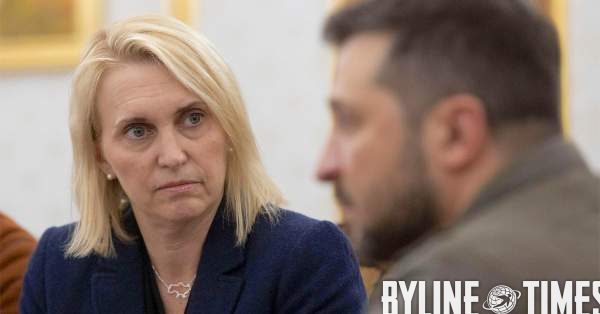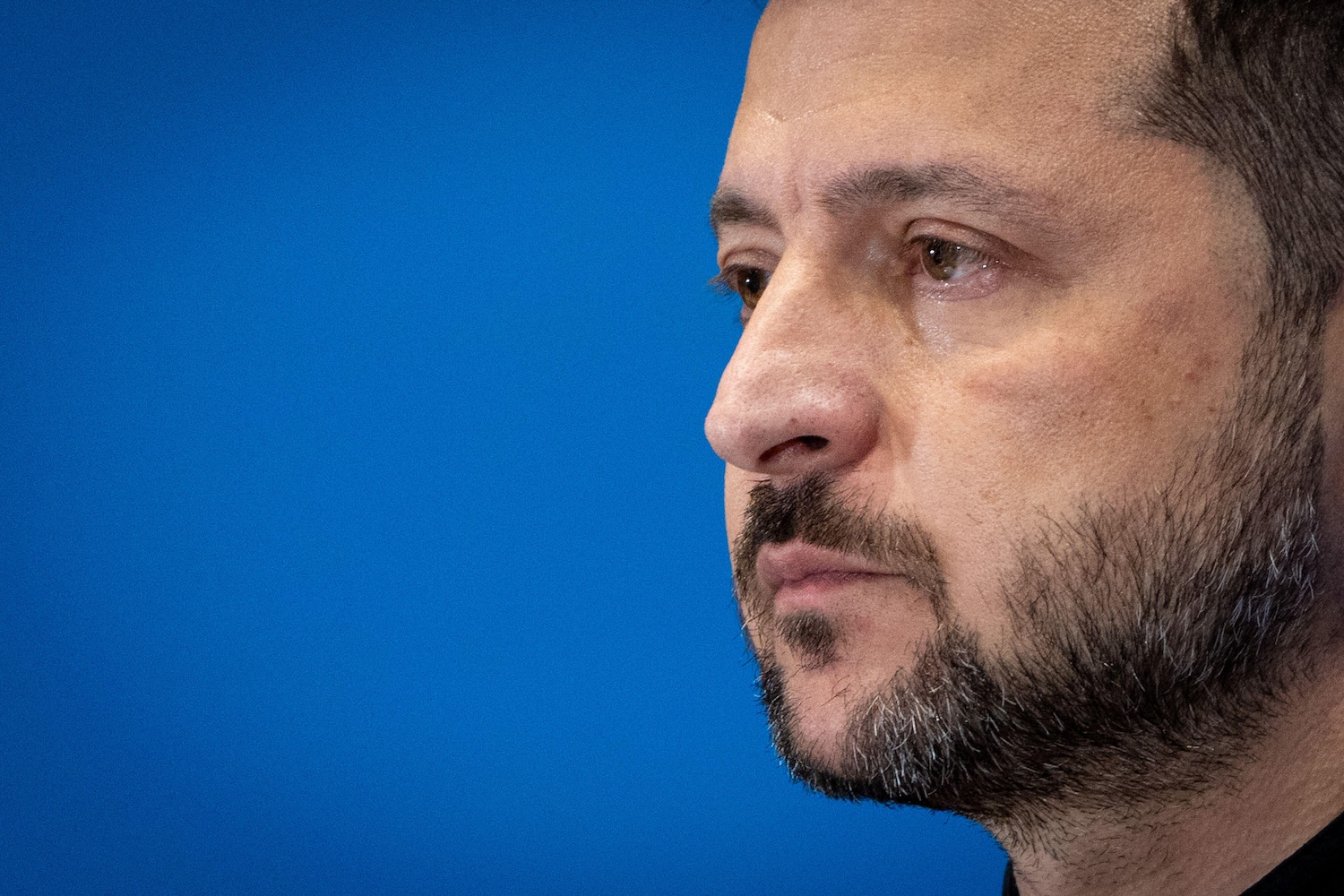Support our mission to provide fearless stories about and outside the media system
Packed with exclusive investigations, analysis, and features
American diplomat, Bridget Brink, resigned in April from her position as US Ambassador to Ukraine, after she concluded she could no longer conduct the Trump administration’s policy towards that country in good conscience. Since then, she has decided to run for public office, as a Democrat Party candidate for the US House of Representatives, representing her home state of Michigan.
I’ve known Bridget for over 12 years, since we were both posted to the Republic of Georgia in the Caucasus in the mid-2010s. We became good friends due to our shared professional and personal interests (she is married to a Brit, I am married to an American, and we have sons of similar age.) Now we have resignations from our respective foreign services in common too – me over Boris Johnson’s dishonesty about Brexit, and her over Trump’s policy on Ukraine.
I recently interviewed her about what propelled her into public service, what brought her to the point of resignation, the dangers she sees to American interests at home and abroad under Trump, and what she hopes to achieve if elected to Congress.
Bridget said she grew up in a small town in Michigan, imbued with the traditional Mid-Western values of hard work, integrity, and “doing the right thing”. She inherited a commitment to the public good from her mother, who was a teacher, her father, a public prosecutor, and her grandparents, who served in World War 2. In 1989, aged 19, she studied abroad for a year at the London School of Economics, just around the time the Berlin Wall came down. “I was too young to know what it all meant, but I knew it was big.” Her time in London, where she later met her husband, “opened my world” and she eventually decided to join the US Foreign Service.
Ukrainian protesters and MPs fear that hard fought progress against systemic corruption in the country is being undone by allies of the President
George Llewelyn
Her career became anchored in Europe, with postings to the Balkans, Georgia, Uzbekistan, Slovakia and finally Ukraine (“the culmination of my experience”) as well as several senior European policy assignments in Washington, serving under Democrat and Republican Presidents. “I was so proud. I loved being a diplomat in Europe. I believed in the values of our country – democracy, human rights, the rule of law, free markets – which we shared with our European partners.” She felt committed to the dream of achieving a “Europe whole, free and at peace”, and regarded the transatlantic relationship as the foundation of American strength, with the US and Europe as each other’s most important security and economic partners, working together to tackle global issues.
Bridget believes the challenge of Russia and Putin predates the current Trump Administration. Successive administrations erred in overestimating the potential for Russia to integrate with the West, underestimating the challenges facing the Russian people after the collapse of the Soviet Union, and misjudging how much they could achieve together. Every President thought they could do better than their predecessors in establishing better relations with Russia, but “Russian goals are completely at odds with ours. Especially under the current President [Putin], their goals are to create chaos, weaken Europe’s democratic institutions, divide the EU, and undermine the US.”
Europe’s problems with populism today stem from these historical roots. Putin was using hybrid tactics very successfully to exploit fissures in democratic societies, for example, by propelling migrants from Syria into Europe to fuel public discord.
When Trump was re-elected President, Bridget hoped she would be able to “make it work” with the new team. Immediately after the November election, she flew to Washington to brief incoming members of his administration. She felt she got a fair hearing. But, immediately after Trump took office she realized his plans to end the war were not going to work. It was “a mistake of historic proportions to treat both sides as the same, not to portray Russia as the aggressor, and Ukraine as the victim, or put any pressure on Putin, but instead, put pressure on the Ukrainians”. Bridget said “I could not execute that policy in good conscience. I could not stay on and be true to my values. There was no choice in my mind.”
She said the disastrous meeting between Trump and Zelensky in the Oval Office in February was only one of many “horrific” incidents, just the most public showcasing of the administration’s problematic stance. Another deathblow was the US’s decision to vote with Russia on a resolution at the UN Security Council around the anniversary of the war. Worst of all was the fact that she was not allowed to identify Russia as an aggressor in her public appearances. Referencing Churchill, she said appeasement was simply wrong. “I’m not about changing history. This was just plain fact, and obscuring it let the aggressor win. I could not do that.”
In March she told her family she planned to resign. In April she informed State Department, and left quickly thereafter. Her 28 years of government service were over.
She described her decision to run for office as providing a positive way forward. “I knew I wanted to keep serving. I knew I would speak out publicly. It took a while to decide on the right course. But, now, I know what I am for.” She added “The one thing the US needs right now is to put some checks and balances on power, and it needs principled leaders who will stand up for the right thing in Washington without worrying about their own career.” She felt it was an asset that she was not a politician, looking for political advancement.
She acknowledged that it was not an easy environment for politicians these days – “there’s intimidation, humiliation of public officials, and ad hominem attacks.” But, she refused to be cowed. “I’ve seen this playbook before, in countries overseas trying to silence their opponents. We cannot be ok with this. We are a strong democracy because we are not about individuals but about institutions and our values. We need to remember who we are. We need to show the next generation that there is a better way forward.”
Trump’s shift from betraying Ukraine to turning on Putin reveals a lot about the man and his Presidency, argues George Llewelyn
George Llewelyn
She described the actions of the current US Secretary of State, Marco Rubio, to dismantle parts of State Department, and fire thousands of State Department employees as shameful, and “wrong at every level”– for the people concerned, who were true patriots, dedicating their lives to serving their country, often in dangerous places, and for American interests. “I believe American should lead in the world, to raise up ourselves and as many other countries as possible to high standards of democracy and human rights.” Without American leadership, other powers would step in, like Russia and China. She was not opposed to the principle of streamlining government, but Rubio’s approach was neither strategic or thought through. He was destroying diplomatic capability in real areas.
More generally, she felt democracy itself in America was at risk. The Trump administration was addressing legitimate governance questions by “killing the patient” – dismantling the career foreign service, eliminating agencies like USAID, attacking the security and intelligence agencies, putting tariffs on friends and allies in a manner that was neither strategic or well-planned. “Fundamental pillars” of American security and prosperity, such as the relationships with the EU and NATO, for which so many fought and died for in World War 2, were being undermined.
I asked if transatlantic relations would be permanently damaged by the Trump’s administration’s actions. Bridget said she was doing what she was doing “because it has to be a blip” – because what was at stake was too big. She felt confident that one day the administration’s actions would be viewed as a mistake, because it was pushing allies away, undermining America’s institutions, and diminishing America’s ability to lead. Europe and America needed to remember what bound them together.
Could trust be restored? “I hope so. By experience and by my profession, it’s never over. We have got to keep fighting for the future we want. It won’t just happen. That’s why we have to stand up and do the right thing, and try like hell to make sure it comes out the right way.”
British and European observers of the current dysfunction in America might be forgiven for thinking America is lost. But, I come across people like Bridget all the time in America – not with her formidable resume and willingness to stand for office, but regular folk equally disgusted by what is happening under Trump, and the pusillanimity of Washington’s current political class, and determined to fight for America’s values and institutions. People like Bridget should give all of us hope for the future. Like she said – “it’s not over.”
ENJOYING THIS ARTICLE? HELP US TO PRODUCE MORE
Receive the monthly Byline Times newspaper and help to support fearless, independent journalism that breaks stories, shapes the agenda and holds power to account.
We’re not funded by a billionaire oligarch or an offshore hedge-fund. We rely on our readers to fund our journalism. If you like what we do, please subscribe.


